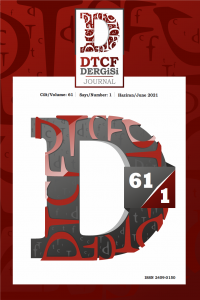Öz
Kaynakça
- Bal, Mustafa. “Memory Plays: Harold Pinter’s Old Times and Anthony Neilson’s Penetrator.” Pamukkale University Journal of Social Sciences Institute 42 (2021): 155-167.
- Dukore, Bernard F. Macmillan Modern Dramatists Harold Pinter. Houndmills: Macmillan Education: 1988.
- Esslin, Martin. The Theatre of the Absurd. New York: Vintage Books, 2001.
- Hollis, James R. Harold Pinter The Poetics of Silence. Illinous: Southern Illinous UP, 1970.
- Ishiguro, Kazuo. “A Family Supper” Discovering Fiction. Eds. Hans P. Guth and Gabriele L. Rica. Boston: Blair Press, 1993. 453-459.
- Ishiguro, Kazuo. “An Interview with Kazuo Ishiguro” Mississippi Review. By Allan Vorda and Kim Herzinger. 20.1-2 (1991): 131-154.
- Jensen, Vernon. “Communicative Functions of Silence.” ETC: A Review of General Semantics 30.3 (1973): 249-257. Web. 17 January 2021.
- Pinter, Harold. “Writing for the Theatre” The New British Drama. Ed. Henry Popkin. New York: 1964.
- Pinter, Harold. “Nobel Lecture Art, Truth & Politics” The Nobel Prize. Web. 9 May 2021.
- “Pinteresque.” Online Oxford English Dictionary. Oxford English Dictionary Online, 2021. Web. 16 January 2021.
- Raby, Peter. “Introduction.” The Cambridge Companion to Harold Pinter. Ed. Peter Raby. New York: Cambridge U P, 2009. 2.
- Rayner, Alice. “Harold Pinter: Narrative and Presence.” Theatre Journal. 40.4 (1988): 482-497.
- Schaffer, Brian W. “‘Somewhere Just Beneath the Surface of Things’: Kazuo Ishiguro’s Short Fiction.” Kazuo Ishiguro. Eds. Sean Matthews and Sebastian Groes. New York: Continuum, 2009. 9-19.
- Walkowitz, Rebecca L. “Ishiguro’s Floating Worlds” ELH 68.4 (2001): 1049-1076. Web. 15 December 2015.
- Zarhy-Levo, Yael. The Making of Theatrical Reputations. Iowa City: U of Iowa P, 2008.
Öz
The purpose of this article is to examine the Pinteresque elements in Kazuo Ishiguro's short
story titled “A Family Supper” (1982). The emphasis will be on the implications of the
Pinteresque as a mood, because today the word is not only a theatrical term but also an
adjective in the Online Oxford English Dictionary. As a theatrical term, the Pinteresque can
plainly be explained as a set of features which recur in Harold Pinter's plays. Namely,
ambiguity of the human condition, uncertainty of the past, use of evasive language, and
halting dialogues that are lled with silences and pauses constitute what came to be
known as the Pinteresque. The overall feeling in a Pinteresque atmosphere is very tense,
strained, and precarious. Additionally, as an adjective, the Pinteresque can perfectly
portray such precarious moments in the everyday life of human beings. That is, just as a
play or a movie can be Pinteresque, so can a moment in human life. In short, this article
treats the term the Pinteresque as an adjective and argues that implicit feeling of menace,
ambiguity of the past, present and future, unspoken conflicts and wounds, triviality of the
conversation, use of evasive language and frequent silences in Kazuo Ishiguro's “A Family
Supper” create a Pinteresque atmosphere.
Anahtar Kelimeler
Kaynakça
- Bal, Mustafa. “Memory Plays: Harold Pinter’s Old Times and Anthony Neilson’s Penetrator.” Pamukkale University Journal of Social Sciences Institute 42 (2021): 155-167.
- Dukore, Bernard F. Macmillan Modern Dramatists Harold Pinter. Houndmills: Macmillan Education: 1988.
- Esslin, Martin. The Theatre of the Absurd. New York: Vintage Books, 2001.
- Hollis, James R. Harold Pinter The Poetics of Silence. Illinous: Southern Illinous UP, 1970.
- Ishiguro, Kazuo. “A Family Supper” Discovering Fiction. Eds. Hans P. Guth and Gabriele L. Rica. Boston: Blair Press, 1993. 453-459.
- Ishiguro, Kazuo. “An Interview with Kazuo Ishiguro” Mississippi Review. By Allan Vorda and Kim Herzinger. 20.1-2 (1991): 131-154.
- Jensen, Vernon. “Communicative Functions of Silence.” ETC: A Review of General Semantics 30.3 (1973): 249-257. Web. 17 January 2021.
- Pinter, Harold. “Writing for the Theatre” The New British Drama. Ed. Henry Popkin. New York: 1964.
- Pinter, Harold. “Nobel Lecture Art, Truth & Politics” The Nobel Prize. Web. 9 May 2021.
- “Pinteresque.” Online Oxford English Dictionary. Oxford English Dictionary Online, 2021. Web. 16 January 2021.
- Raby, Peter. “Introduction.” The Cambridge Companion to Harold Pinter. Ed. Peter Raby. New York: Cambridge U P, 2009. 2.
- Rayner, Alice. “Harold Pinter: Narrative and Presence.” Theatre Journal. 40.4 (1988): 482-497.
- Schaffer, Brian W. “‘Somewhere Just Beneath the Surface of Things’: Kazuo Ishiguro’s Short Fiction.” Kazuo Ishiguro. Eds. Sean Matthews and Sebastian Groes. New York: Continuum, 2009. 9-19.
- Walkowitz, Rebecca L. “Ishiguro’s Floating Worlds” ELH 68.4 (2001): 1049-1076. Web. 15 December 2015.
- Zarhy-Levo, Yael. The Making of Theatrical Reputations. Iowa City: U of Iowa P, 2008.
Ayrıntılar
| Birincil Dil | İngilizce |
|---|---|
| Konular | Sanat ve Edebiyat |
| Bölüm | Araştırma Makaleleri |
| Yazarlar | |
| Yayımlanma Tarihi | 24 Haziran 2021 |
| Gönderilme Tarihi | 1 Mart 2021 |
| Yayımlandığı Sayı | Yıl 2021 Cilt: 61 Sayı: 1 |
Ankara Üniversitesi Dil ve Tarih-Coğrafya Fakültesi Dergisi Creative Commons Atıf 4.0 Uluslararası (CC BY 4.0) ile lisanslanmıştır.

